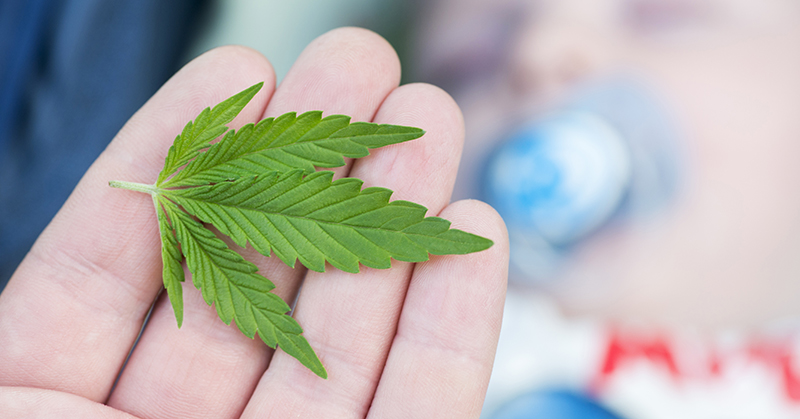DNA changes could lead to behavioral, neurological effects

Offspring of female nonhuman primates given a cannabis product during pregnancy had changes in their DNA expression like those seen in human children with autism spectrum disorder and attention deficit hyperactivity disorder, according to a small study funded by the National Institutes of Health. The changes involved addition of chemicals known as methyl groups to DNA, which switch genes on or off without changing their structure. The findings suggest that children whose mothers consume edibles or other products containing Delta-9-tetrahydrocannabinol (THC), the main psychoactive substance found in cannabis, could experience permanent developmental changes.
The study was conducted by Lyndsey Shorey-Kendrick, Ph.D., and Jamie Lo, M.D., M.C.R., of the Oregon Health Sciences University, and colleagues. It appears in Clinical Epigenetics. NIH funding was provided by the Eunice Kennedy Shriver National Institute of Child Health and Human Development and the National Institute on Drug Abuse.
Background
Cannabis refers to all products derived from the plant Cannabis sativa, commonly referred to as marijuana. The use of the plant and products derived from it have increased as several states have legalized its recreational and medicinal use, the authors wrote. Legalization also may have reduced concerns of cannabis’ potential health effects. Many pregnant women use cannabis early in pregnancy as a treatment for morning sickness, and others use it throughout pregnancy.
THC can cross the placenta. It resembles naturally occurring cannabinoid molecules produced by the body and binds to cannabinoid receptors in the placenta, the developing fetal brain, and other fetal organs. Only a few studies have been conducted on cannabis use during pregnancy, but these have linked cannabis exposure to preterm birth, still birth, and infants being born small for their gestational age. Other studies have linked cannabis use during pregnancy with offspring autism spectrum disorder, attention deficit hyperactivity disorder, intellectual disability, and learning disorders. Preliminary studies in humans and rodents suggest that changes in DNA methylation may underlie these cannabis-associated changes.
To mimic cannabis exposure during human pregnancy, researchers fed a daily cannabis-infused edible (a cookie) to five pregnant female macaques each day until the animals delivered their infants.
Results
The investigators found 581 methylation differences in DNA from the offspring of macaques fed a daily edible, compared to the offspring of monkeys fed a cookie without THC. Although methylation changes were found in brain, lung, and heart tissue, 573 of 581 (98%) of the changes occurred in the placenta. Many of the placental methylation changes corresponded with those in placentas from a study of human infants later found to have autism spectrum disorder.
Significance
“Cannabis is one of the most commonly used drugs and is widely available across the country, so there is a common perception that its completely safe to use,” Dr. Shorey-Kendrick said. “If we’re able to better understand the impacts, we can more effectively communicate the risks to patients and support safer habits during the vulnerable prenatal period.”
The authors noted that previous studies have found that the placenta produces compounds, known as neurotransmitters, that may directly influence the fetal brain. Other studies have linked malfunctioning placentas with children’s poor neurological and behavioral outcomes.
“It’s not common practice for providers to discuss cannabis use with patients who are pregnant or trying to conceive,” Dr. Lo said. “I hope our work can help open up a broader dialogue about the risks of cannabis use in the preconception and prenatal period so we can improve children’s health in the long run.”
Reference
Shorey Kendrick, LE, et al. Prenatal delta-9-tetrahydrocannabinol exposure is associated with changes in macaque DNA methylation enriched for autism genes. Clinical Epigenetics. 2023.

 BACK TO TOP
BACK TO TOP